Is there anything so satisfying as introducing someone to a book that you love? In librarianship it certainly falls under the categories of both personal passion and professional responsibility (see our own Staff Pickles for examples). And the Reading Favourites session at WORD Christchurch yesterday had a similar vibe - of reading enthusiasts, well, enthusing.
Renowned New Zealand children's author, David Hill; editrix of Tell you what, and comparative literature PhD, Jolisa Gracewood; and author and founder of the Academy of New Zealand Literature, Paula Morris, all took the stage to wax lyrical about their favourite New Zealand reading. Poet Chris Tse was also supposed to be part of this panel but was unable to attend due to illness. A shame, and it would have been good to have another, and yes I'm going to say it, younger voice in the mix but it was still definitely a session worth attending regardless.
Things kicked off in a jovial manner with Paula relating the ridiculous predicament of having flushed her reading glasses down the toilet and having to make do with some hastily bought, budget ones.
And then, because it's National Poetry day, each read a short poem, Jolisa and David both choosing pieces from well-worn copies of 100 New Zealand Poems edited by Bill Manhire. This is a collection that Jolisa called "subversive" due to its lack of attribution of the poems unless... you refer to the index, a device that perhaps forces the reader to engage with the poem on its own merits.
I'm ashamed to admit that I've already forgotten the name of the 4 line poem that Jolisa recited, but do clearly remember that I liked it, and can accurately report that David Hill's choice was The Adorable Thing about Mozart by Elizabeth Smither.
Paula Morris encouraged us all to read some other piece of poetry for ourselves, preferably out loud (or possibly in public), reflecting that "...you can do anything in Christchurch these days..."
Well not quite, but surely, on a wild and wet winter day a verse or two of Hone Tuwhare, either whispered or shouted at the sky wouldn't be considered too transgressive?
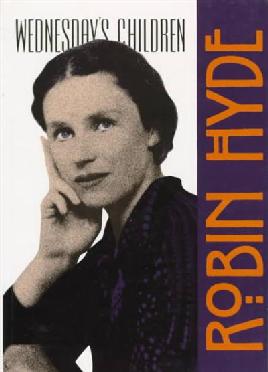 Jolisa's first choice of favourites was Wednesday's children by Robin Hyde. Her copy of this novel about a woman who wins the lottery and "lives as she pleases" has its own story. It was bought here in Christchurch at a library book sale and still retains its borrowing slip, and cards in a pocket at the back. Initially it went unread (by her) for quite some time and it wasn't until a boyfriend of Jolisa's started reading it and really enjoyed it that it came back onto her radar - a unexpected surprise of a read.
Jolisa's first choice of favourites was Wednesday's children by Robin Hyde. Her copy of this novel about a woman who wins the lottery and "lives as she pleases" has its own story. It was bought here in Christchurch at a library book sale and still retains its borrowing slip, and cards in a pocket at the back. Initially it went unread (by her) for quite some time and it wasn't until a boyfriend of Jolisa's started reading it and really enjoyed it that it came back onto her radar - a unexpected surprise of a read.
Wednesday's children set in the 1930s and is about women, women on welfare, and women with children - all things that are as relevant now as they ever were. Though sadly it is no longer in print (so get a reserve on a library copy if you fancy trying it).
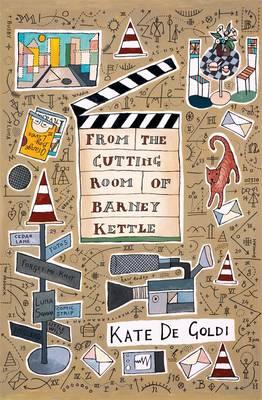 David Hill's first choice was much more current, namely last year's From the cutting room of Barney Kettle by Kate De Goldi. David admitted it made him both weep and laugh and said that De Goldi's writing was "crystalline" and sharp. Moreover the adults in it are depicted as "fallible, real human beings and not caricatures". He said he was "honoured to be thrashed by her in the children's book awards".
David Hill's first choice was much more current, namely last year's From the cutting room of Barney Kettle by Kate De Goldi. David admitted it made him both weep and laugh and said that De Goldi's writing was "crystalline" and sharp. Moreover the adults in it are depicted as "fallible, real human beings and not caricatures". He said he was "honoured to be thrashed by her in the children's book awards".
Jolisa's second choice for favourite read was by another Christchurch author, this time Margaret Mahy, and her young adult novel The Tricksters.
Set in the general vicinity of Lyttelton Harbour, Jolisa went into movie trailer voiceover mode describing its tagline as "The Christmas it all fell apart...". It's a story about a family and an earth-shattering revelation but it also has elements of the supernatural. 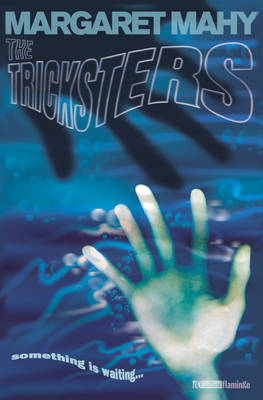 Even as a confessed rationalist she still enjoys books that "ask you to take on faith that there are other worlds..." which is something we have in common. I can't abide notions of magic or "woo" in real life yet find this not only permissible but desirable in fiction.
Even as a confessed rationalist she still enjoys books that "ask you to take on faith that there are other worlds..." which is something we have in common. I can't abide notions of magic or "woo" in real life yet find this not only permissible but desirable in fiction.
This book too, is sadly out of print, but Jolisa's hope is that with the film of The Changeover (based on Mahy's novel) being made, other "adjacent" Mahy young adult fiction will receive renewed interest. (If we're casting votes, may I also suggest The Catalogue of the Universe and Memory? Please and thank you.)
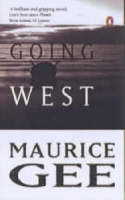 David Hill's second choice was Maurice Gee's Going West. He described Gee as very "modest" and the least "show-off" writer he knows, and described a tension between his quiet style and the quite shocking events that unfold. In fact, he's so good that "I'm not even jealous". Happily Going West is still in print, and via someone in the audience, who presumably has the inside line on things Gee, we learned that there will be a new young adult novel out in February 2017.
David Hill's second choice was Maurice Gee's Going West. He described Gee as very "modest" and the least "show-off" writer he knows, and described a tension between his quiet style and the quite shocking events that unfold. In fact, he's so good that "I'm not even jealous". Happily Going West is still in print, and via someone in the audience, who presumably has the inside line on things Gee, we learned that there will be a new young adult novel out in February 2017.
Digressions were common (and welcome - at least by me) throughout the session, and Paula Morris's reflection that Gee's novels being set in Henderson, where she grew up, meant something led into the question of whether or not New Zealand writers should include New Zealand place names in their work. What if it's jarring or too "foreign" for non-Kiwi readers? Apparently these are questions that publishers want to know the answers to, as David Hill has been asked this himself.
I liked Paula Morris's sarcastic remark on this that readers would surely be completely bewildered - "I thought this was happening in London... but apparently it's Taihape..."
Well, quite.
David Hill went as far as throwing the question to audience member Ted Dawe aka "another author who beat me in the children's book awards", who said that he didn't like to be too specific about anything in his books, but even so the US version of Into the river has a 130 word glossary, providing meanings for every Māori word used, for instance.
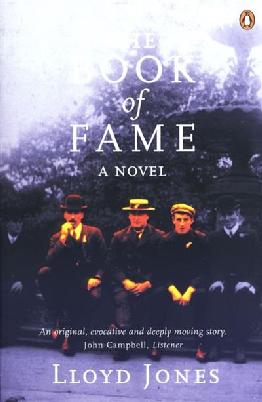 Paula Morris also picked two favourites, the first being The book of fame by Lloyd Jones, a really funny book that nevertheless got sneering reviews in the UK but which "everyone I've ever recommended it to has really loved it".
Paula Morris also picked two favourites, the first being The book of fame by Lloyd Jones, a really funny book that nevertheless got sneering reviews in the UK but which "everyone I've ever recommended it to has really loved it".
She also recommended Māori boy by Witi Ihimaera which, as a memoir, is necessarily "full of lies" but is "searingly honest" as well.
The session veered off at the end towards discussing the eternal question of why people don't read more New Zealand fiction. Kiwi authors do well with children's books but somehow this doesn't translate to adult readers.
Jolisa suggested that being forced to read something at high school in an "eat your veges - this is good for you" kind of way could harden a reader against particular writers, and I must admit I still bristle at the suggestion I read any Janet Frame again, ever. So I think there may be some truth in that.
Paula Morris in particular highlighted some of the odd "prejudices" that create barriers to people reading New Zealand fiction - the notion that it's all doom and gloom, "man alone" stuff when that's demonstrably not the case. Would reading one depressing British author put you off reading British authors for life? So why does that seem to apply with local literature?
I couldn't help thinking that this is very similar to the problem of representation and diversity in media generally. We're used to what we're used to and what we're used to is a particular kind of voice. In movies this has typically been male and white and probably American. But things are slowly changing. Kiwi films are going gangbusters at the box office, ones with indigenous faces and voices, even. And there was a time when a nightly Kiwi soap opera was a risky proposition rather than an institution. Perhaps the next Ghostbusters reboot or Hunt for the Wilderpeople* of New Zealand fiction is just around the corner?
Here's hoping. In the meantime, we've all got some favourites to try.
More WORD Christchurch
- WORD Christchurch website
- Our WORD Christchurch 2016 overview
- Our posts about WORD Christchurch 2016
*Technically the Hunt for the Wilderpeople of New Zealand fiction is Wild pork and Watercress, but you get my meaning.




Add a comment to: Reading favourites – WORD Christchurch